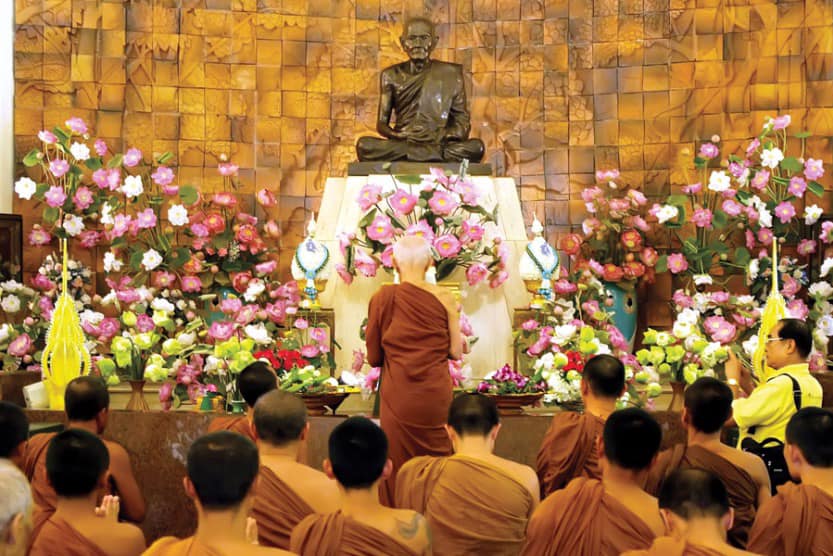Dhamma
Meditation is the heart of practice at Wat Pa Baan Taad. Guided by the teachings of Venerable Ajaan Mahā Boowa Ñānasampanno, our approach to meditation emphasizes mindfulness, strict monastic discipline, and ascetic practices.
Dhamma
Meditation is the heart of practice at Wat Pa Baan Taad. Guided by the teachings of Venerable Ajaan Mahā Boowa Ñānasampanno, our approach to meditation emphasizes mindfulness, strict monastic discipline, and ascetic practices.
Understanding Dhamma
At Wat Pa Baan Taad, meditation is not merely a practice but a way of life. It is a dedicated path to purify the mind, cultivate wisdom, and ultimately attain Nibbāna. Our meditation practice is rooted in the ancient traditions passed down by the Buddha and preserved by the Thai Forest Tradition.
Core Teachings of Dhamma
The Four Noble Truths:
Dukkha (Suffering):
Recognizing the inherent unsatisfactoriness of life.
Samudaya (Origin of Suffering):
Understanding that craving and attachment are the causes of suffering.
Nirodha (Cessation of Suffering):
Realizing that ending craving leads to the cessation of suffering.
Magga (Path to the Cessation of Suffering):
Following the Noble Eightfold Path as a means to end suffering.
The Noble Eightfold Path:
Right View:
Understanding the nature of reality and the path of transformation.
Right Intention:
Commitment to ethical and mental self-improvement.
Right Speech:
Speaking truthfully and harmoniously.
Right Action:
Acting in ways that do not harm others.
Right Livelihood:
Earning a living in a way that does not harm others.
Right Effort:
Cultivating positive states of mind; freeing oneself from negative states.
Right Mindfulness:
Developing awareness of the body, feelings, thoughts, and phenomena.
Right Concentration:
Developing the mental focus necessary for effective meditation.
Core Teachings of Dhamma
The Four Noble Truths:
Dukkha (Suffering):
Recognizing the inherent unsatisfactoriness of life.
Samudaya (Origin of Suffering):
Understanding that craving and attachment are the causes of suffering.
Nirodha (Cessation of Suffering):
Realizing that ending craving leads to the cessation of suffering.
Magga (Path to the Cessation of Suffering):
Following the Noble Eightfold Path as a means to end suffering.
The Noble Eightfold Path:
Right View:
Understanding the nature of reality and the path of transformation.
Right Intention:
Commitment to ethical and mental self-improvement.
Right Speech:
Speaking truthfully and harmoniously.
Right Action:
Acting in ways that do not harm others.
Right Livelihood:
Earning a living in a way that does not harm others.
Right Effort:
Cultivating positive states of mind; freeing oneself from negative states.
Right Mindfulness:
Developing awareness of the body, feelings, thoughts, and phenomena.
Right Concentration:
Developing the mental focus necessary for effective meditation.
The Role of Vinaya
Vinaya means discipline, the rules of right living which promote the harmony and well-being of the community of those devoted to the path of Dhamma. It includes guidelines for monastic conduct and the daily practices that support a life dedicated to spiritual development.
Dhamma in Practice
At Wat Pa Baan Taad, the practice of Dhamma is woven into the fabric of daily life. Monks and lay practitioners alike strive to embody the teachings through mindfulness, meditation, ethical conduct, and communal harmony. The teachings of Venerable Ajaan Mahā Boowa Ñānasampanno emphasize the relentless pursuit of mindfulness and the cultivation of wisdom.
Support
Living Dhamma
Living in accordance with Dhamma means aligning one’s actions, speech, and thoughts with the principles of truth, compassion, and wisdom. It is a path of continuous learning, self-reflection, and personal growth. By embracing the Dhamma, one can achieve inner peace and contribute to the well-being of the broader community.
Dhamma is not merely a set of teachings but a living, breathing guide to a harmonious and enlightened life. By understanding and practicing Dhamma, individuals can navigate the complexities of existence with grace, compassion, and wisdom, ultimately realizing the profound truths taught by the Buddha.











